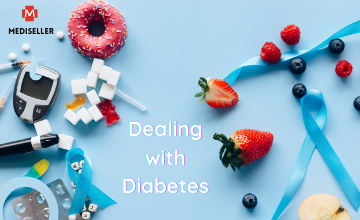Constantly having to check your blood sugar levels, always being wary of what you eat, and the expensive medications that you have to take can make dealing with Diabetes stressful, overwhelming, and emotional at times.
Through the rest of this blog, we'll take you through some tips to help deal with diabetes type 2. But before we proceed, let’s first understand what type-2 diabetes is.
What is Diabetes Type-2?
Type-2 Diabetes is a chronic metabolic condition where the body fails to utilize the insulin produced, or in other words, the body becomes resistant to insulin. Type-2 is the most common type of diabetes, usually seen in middle-aged or older people.
The human body produces insulin, which works to metabolize glucose in the body to produce energy. People affected by type-2 diabetes produce insulin however, the body cells do not utilize it effectively, causing sugar level spikes.
Type-2 diabetes could be caused by obesity, metabolic syndromes, or broken beta cells or can be passed down genetically.
Dealing with Diabetes Type-2
Managing Diabetes may feel overwhelming at times, but your choice to put yourself on a path to better health does not have to be. Dealing with diabetes is about making those simple healthy choices.
A combination of lifestyle changes, medication, and determination will aid in maintaining a healthy blood sugar level. It takes dedication and time, but prioritizing those changes will help reduce or avoid severe complications due to diabetes.
If you are ready to make those choices, here are some tips to help you get better health.
Lose those extra pounds
Being overweight is one of the key factors for diabetes. No, you don’t have to hit the gym six days a week and build a shredded body.
All you have to do is quit being a couch potato, get active, and lose that extra weight you carry. Extra weight in our bodies is stored as fat. Excessive fat may disrupt the normal functioning of vital organs, worsening the progression of diabetes.
Physical activity for around 30 minutes every day, can stabilize blood sugar levels and aid weight loss.
Exercising is not a punishment. If it feels like a punishment, chances are that you will give up too soon. So find something that you enjoy doing.
You are what you eat.
Controlling your diet and making healthier mealtime choices go a long way in the fight against Diabetes.
Diet is as simple as reducing your simple carb intake and replacing it with more complex carbs.
Complex carbs contain more nutrients and are more filling than their simpler counterparts.
Foods that contain added sugar can be detrimental to your health and should be avoided. Some common foods to avoid are soda, ice cream, cookies, pastries.
The idea is not to cut out simple carbs entirely but rather to find the right type of carbs. For example, the next time you get a craving for sweets, have some fruit instead of a pastry.
Build a support system
Managing diabetes can often be emotional. You may not feel like showing it, but it is essential to acknowledge your feelings.
Sometimes venting about how you feel can make you feel a lot better. Get support from your family, friends, or healthcare providers.
You can make healthy food choices a family thing and eat healthy meals together. You could get a couple of friends to join you with your exercise routine.
Dealing with stress
Having Diabetes can be stressful. Check blood sugar levels frequently, taking meds on time, and making healthy decisions are all in a day's work for you. Oftentimes, this may feel like a lot to deal with and result in what is known as diabetes distress.
The good news is that there are ways you can cope with diabetes distress.
Talk to your healthcare providers. They can help you solve your concerns and suggest counseling if you need it.
Get into a support group. Joining a support group and spending time with people who are more or less on the same page with you can be a great relief.
Managing expenses. A major cause of worry during diabetes is the treatment expense. Talk to your doctor about any government programs that aid diabetes patients.
Final thoughts
Educating yourself about diabetes and clearing any doubts you have with your healthcare provider will make it feel less overwhelming.
Diabetes is a progressive disease, the earlier you detect and the earlier you step up and take action, the better.




.png)
.png)
.png)
.png)
.png)
.png)
.png)
.png)


0 Comment